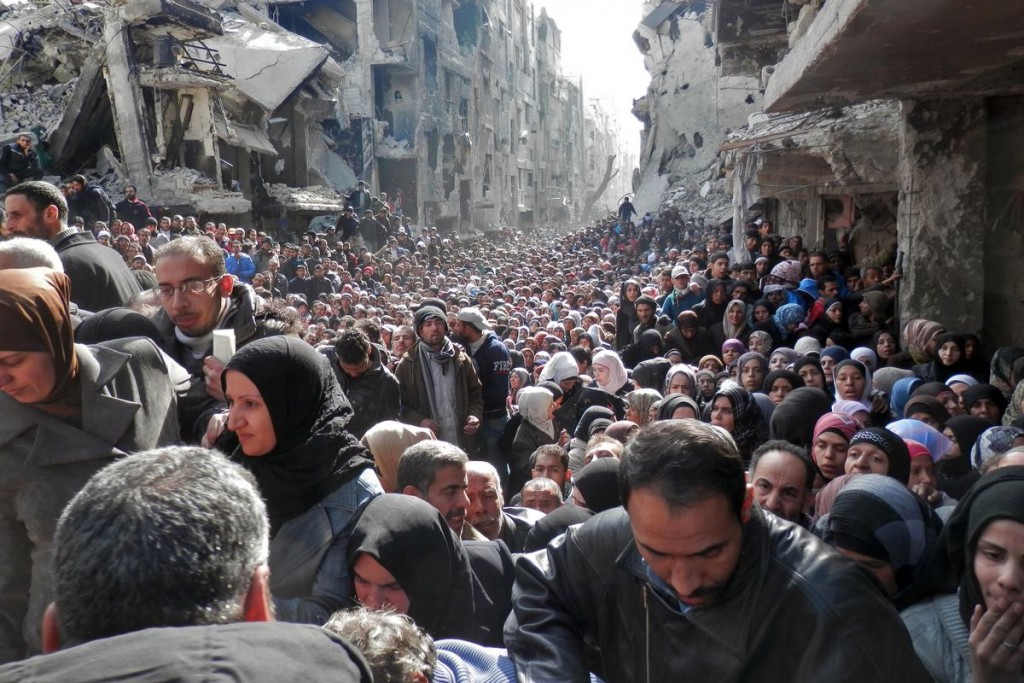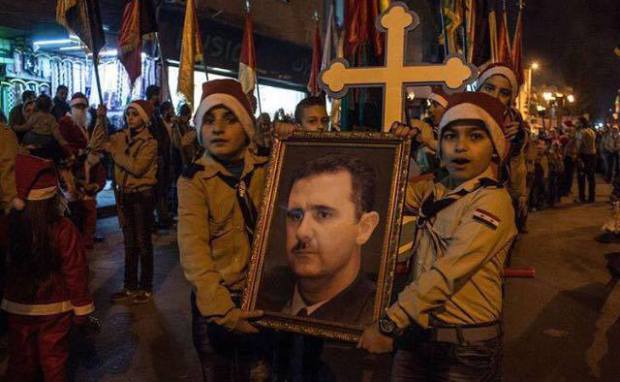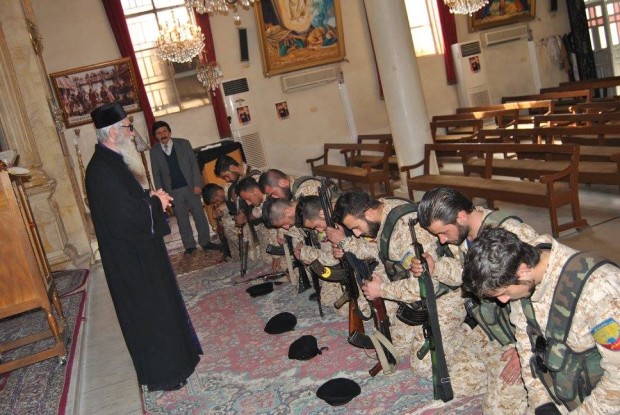By James Perloff
“H” was born in Damascus, and legally immigrated to the United States from Syria more than 20 years ago, long before the current war began. She became a U.S. citizen and earned a doctor’s degree from an American university. She is completely fluent in both English and Arabic. She recently returned from a trip back to Syria, where she has many family members and friends who keep her apprised of the situation there. She is also one of the kindest and most devoted Christians I have ever met. I am keeping H’s name confidential, as I do not wish this interview to in any way jeopardize her family’s safety in Syria, or the status of her professional work in the U.S.
I originally anticipated that our discussion would be two-part; first I would give her a short primer on the back story of American politics. When we sat down, I told H that I have been a journalist since 1985. I began to explain that America is run by an oligarchy that conceals itself behind a façade of two-party democracy, that Presidential candidates have long been pre-selected, that Americans have been repeatedly deceived into wars, and that our press is controlled by the same establishment that controls the politicians. H was smiling, and I could swiftly tell that nothing I said was news to her. And so it was affirmed that what famed commentator “Syrian Girl” (whose Facebook and YouTube accounts have been censored) said is true: Syrians are well informed about the New World Order. Indeed, Syrians know more about the realities of American geopolitics than most Americans do. So, after about four minutes, I laughed, and told H that my “lecture” was over. I now asked her to tell me the truth about Syria.
JP: First of all, tell me about Bashar al-Assad. The American media and many politicians here portray him as an evil dictator who is oppressing the people of Syria, and who must be overthrown in one of our never-ending “regime changes.” How do the people of Syria themselves feel about Assad? Especially, I’d like you to tell my readers how Syria’s Christians regard him.
H: They love him. The Christians adore him. He respects all religions. Many Americans have the misconception that Syria is a Muslim state. It is not. It is a secular state, although the Christians are in the minority.
Every month, Bashar visits the nuns of Mar Thecla monastery, the ones who were kidnapped by ISIS, and he has also visited Seidnaya Monastery.
Bashar was not supposed to become President, you know. His brother was being groomed for that position. Bashar was trained to be an eye doctor, an ophthalmologist. But after his brother died, his father asked him to prepare to take the leadership.
Bashar brought great prosperity to Syria. Years ago, after the U.S. placed sanctions on us, we were forced to make our own goods. It was hard, but we became self-sufficient and began exporting many products. You know, Syria had no debt before the war. So we find it humorous when the American press calls us a “Third World country,” considering how much debt the U.S. has.
As to Assad, he is loved by Syrians. He used to go out unprotected among the people, no bodyguards. You know, he is an Alawite [Alawites are branch of Shiite Islam], and most of Syria’s Muslims are Sunnis, but they love him anyway. Of course, some of them would prefer to have a Sunni President, and there are people opposed to him. But there is not one president who is well liked by all his people; look at Obama, or Trump, no one has a 100 percent approval, but the majority of Syrians love Bashar. I personally know people who went to school with him, and they all vouch for his character.
JP: In the Syrian army, are the Christians comfortable fighting alongside Muslims?
H: Yes. They are fighting the same enemy. Many Christians have died in the Syrian army. I’m going to find you some pictures of Christian soldiers praying at church before going into battle.
JP: Now as to the so-called “rebels” whom the U.S. is backing, how many are actually Syrians?
H: 80 to 90 percent are foreigners—most don’t even speak Arabic [the native language of Syria]. They come from all over the world—Afghanis, Saudis, Libyans, Chechens, even from as far as Canada. They are trained in Turkey and Jordan.
JP: I have been told that the U.S. is paying these mercenaries more than it pays our own soldiers.
H: I wouldn’t know about that, but they work for whoever pays them the most.
JP: It seems fair to say that the New World Order believes they can get anyone to work for them if they pay them enough money, whether it’s bankers, politicians, newscasters. or soldiers. Now in America we hear a lot of confusing terms to describe the “rebels”—ISIS, Daesh, Al Qaida, Al Nusra, the White Helmets. Can you elaborate?
H: ISIS is the same as Daesh; they are supported by Saudi Arabia. Jabhat al-Nusra get support from Qatar. They are both allies of the U.S., and the U.S. knows that, and keeps calling them “moderate rebels.” Jabhat al-Nusra, Al Qaida, the White Helmets, they are basically the same. Whatever their names, they are paid to make war in Syria.
JP: As I’m sure you know, the film The White Helmets was given an Oscar as “Best Documentary.” It’s a great example of how politicized Hollywood is. Of course, Hollywood is run by the same Establishment that controls the news media and the government.
H: Actually, I was not aware of, nor did I see that movie. In Syria, we call them “Evil Helmets” or even “Devil Helmets.” They make a lot of fake news. When the fighting started around Homs, hooded men came and forced my aunt and some of her neighbors out of bed; they were made to stand outside in their nightclothes. The militants videotaped them, and then it was aired on Al Jazeera saying “This is what Assad is doing to his people.” As you may know, Al Jazeera did a deal with Al Gore’s channel. It all reminds me of the movie Wag the Dog, where the government hires a Hollywood director to film a fake war, which they put on the news like it was really happening. It is easy to fabricate fake news nowadays.
JP: I want to recommend that my readers watch Wag the Dog if they haven’t done so. In fact, I will link to a clip from that film. Now, what would happen to Syria’s Christians if Assad was overthrown and these people were victorious?
H: You don’t want to know.
In Maaloula, four Christians, three men and a lady, had guns put to their heads by ISIS and were told to renounce Christ or they would be killed. They refused to renounce Christ. So they were all shot; the men were martyred, and the woman was left for dead, but she was still alive and lived to tell the story. But I want you to know all these groups not only kill Christians, but also kill Muslims who do not agree with their beliefs, whether they are Sunnis, Shiites, or members of other branches of Islam.
JP: To me, it is insanity that we have Trump supporters here in America, who are professing Christians, but who cheer his “Assad must go” policy, which is identical to the Neocon “Assad must go” policy of Obama, John McCain and Hillary Clinton. As you know, after he launched the 59 cruise missiles against Shayrat Air Base, I wrote an article called 14 Reasons Why the Syria Airstrikes Were a Really Bad Idea. As just one example, you cannot dismantle chemical weapons by bombing them; this would only release them into the atmosphere, harming people. This was positive proof that the Trump administration knew Assad had not dropped chemical weapons on his own people.
H: And what would Assad’s motive be, right after winning a huge military victory? [Allepo] Whenever the media starts talking about chemical weapons, it means one thing: the Syrian army has had a major success. Like the one we just had in Ghouta, which we desperately needed, because if Ghouta fell, Damascus could fall, and that would be the end of Syria. America wants to curtail the advancement of the Syrian army, so they create an excuse to bomb the army whom we desperately need to protect us.
JP: Yes. In fact, right after Trump bombed the air base, ISIS launched a new offensive near Homs. So what Trump in effect did was to deliver a flank attack in support of ISIS, which is very ironic, since he largely came to power as an opponent of Islamic extremism. Of course, America has long been covertly backing ISIS with weapons and training. Tell me, what do Syrians think the U.S. government’s motives are?
H: In Syria we say: America is not America, America is Israel.
JP: There are former members of Congress, such as Cynthia McKinney and Jim Traficant, who have confirmed what you just said.
H: My mother is from Homs; that is where the militants had their very first victory. Do you know what flag they raised there when that happened?
JP: No, I don’t.
H: It was the Israeli flag. My friends and family members took pictures of it, then it was quickly taken down.
JP: Well, I guess that should come as no surprise. ISIS never attacks Israel, their wounded have been cared for in Israeli hospitals, and there was an Israeli colonel [Yusi Oulen Shahak], captured among ISIS forces. I recently read that the U.S. military has conducted a joint exercise with the Israelis, the largest ever. It included a mock attack on Syria, Lebanon and even Gaza.
H: I didn’t know that, but I do know the Americans now have about 20 bases in Syria. They got help from the Kurds.
JP: Twenty? Well, then they are really serious about extending the war. And they have no right to be there. You can imagine how Americans would react if a foreign country launched cruise missiles on us, and built bases on our soil. By the way, where did you get that information about the 20 bases?
H: From the Syrian news, as well as my contacts in Syria.
JP: How reliable do you consider the Syrian news media?
H: Well, I have to say that in any country, there will be a certain amount of bias in its news media. That’s why it’s always important to also have your own contacts through social media, friends and family on the ground, who can tell you what’s really going on.
JP: Next I want to ask you how Syrians feel about the Russians.
H: If it weren’t for Russia’s intervention, Syria would have fallen a long time ago. Russians are good people in the opinion of Syrians. They never betrayed us. You know, when I was growing up in Syria, we lived very close to their government offices. I used to see them at the swimming pool. I was very comfortable among them, they were nice people who minded their own business.
Syrians trust Russia to keep its word, but they don’t trust the U.S. Everyone in Syria, and in the entire Middle East, knows that America can be your friend one day, then stab you in the back the next, because they betrayed Arabic countries so many times.
JP: Well, we have plenty of examples of that—as I’m sure you know, at one time we were arming Saddam Hussein, and before him the Taliban.
H: Yes. By the way, there was a time when Syrians really liked and respected America. But that has changed over the last twenty years.
JP: Right now there is a huge Christian revival in Russia, and Putin of course is an Orthodox Christian. Recently I read that one reason he intervened in Syria was to protect the Orthodox Church, which has been in Syria for 2,000 years, and that he’d been encouraged to do so by Patriarch Kirill.
H: Well, I don’t know, that may be true. However, I also want to say that no nation sacrifices its soldiers unless it is in its own national interest. Russia has oil and natural gas interests in Syria, and it also gives them additional access to the sea, which they need. Of course, the West has its own plans for Syrian oil and gas, which would threaten Russia’s economy.
You must understand, the situation in Syria is very complex. We have the Golan Heights that Israel took from us and does not want to give back, so Syria is at odds with Israel. There are Sunnis in Syria who would like to replace Assad with a Sunni president; this would of course make Saudi Arabia happy, which is a Sunni country, and weaken Iran which is a Shiite country. There are many factors and reasons for this war, let’s call it a World War III happening through mercenaries in Syria, as well as in Iraq and Yemen. The same players are in those countries. So in a nutshell, it is a war between two major powers, America and Russia, with their allies, in our land.
In fact, this recent business with the murdered Russian double spy, and the expulsion of Russian diplomats, it may be no coincidence that this occurred at the same time as our success in Ghouta. Our information is that the Russians strictly warned the U.S. not to interfere by bombing our army, or there would be consequences.
JP: Well, we’ve all been wondering if the West was using the Skripal affair to start a World War! But in other words, they might really be trying to pressure Russia into backing down in Syria.
H: Yes, or to make some kind of deal about Syria.
JP: Next I want to ask you a question that may be difficult for you to talk about. One day a few weeks ago I saw you crying and wearing black. I asked what happened, and you said your area near Damascus had been heavily bombed by the Israelis.
H: Not only by the Israelis, but by Jibhet el Nousra also. They use an illegal type of bomb, I cannot remember what it is called. But there were many casualties, and none of this was reported in the American media. We [H and her immediate family] were lucky, because we were just over there, but not at the time it was bombed.
JP: I read that the Israelis try to justify these attacks by saying there are Iranians in Syria.
H: Oh, Jim, the Israelis do not justify! They do whatever they like. They know they can get away with anything.
JP: Well, let me ask this. Are there Iranians in Syria?
H: Yes. We have Iranian volunteers in the Syrian army. We have lost so many soldiers in this war, so we need the help.
JP: And Iranians, why would they fight for Syria?
H: Because they know that if Syria falls, Iran is next.
JP: Well, that is a reason that makes sense.
H: Of course, the Iranians also support Hezbollah in Lebanon. Did you know that only in America, Hezbollah is called terrorists? In Europe, nobody calls them that.
JP: How optimistic or pessimistic are Syrians about victory?

The Yarmouk refugee camp in Damascus, pictured above in a 2014 photo, has been described as a “living hell” and “the “worst place on Earth.
H: We hope for victory, and are encouraged by the successes of the Syrian army, but the people are getting worn out. Many are hungry and depressed; a lot of them have no money anymore, because they haven’t been able to work for years due to the war. In Syria, when someone says “Have a nice day,” it has a different meaning than in America. In Syria “Have a nice day” usually means, “I hope you come back alive and in one piece.” Because you know, you can come back alive, but still not be in one piece.
JP: Is there anything else you would like Americans to know?
H: The reason there is a “Syrian immigration crisis” is the war. Many people have been forced to leave because they have no choice. Leave us alone, and there will be no Syrian immigration problem.
I would also like to say that I love America, and am happy, grateful, and honored to be called an American. I simply disagree with its Middle East policies. I encourage people to look beyond the headlines, and think before forming an opinion. Governments all over the world create false pretexts for wars.
I challenge Americans and America’s leaders, and the world’s leaders, to compete in advancing humanity, instead of competing in creating weapons that destroy humanity. It is a dream of mine to see people working together instead of against each other, creating abundance, not fear and scarcity. When others are doing well, we all do well. As the Apostle John said, if you don’t love your brother whom you have seen, how can you love God whom you have not seen?










